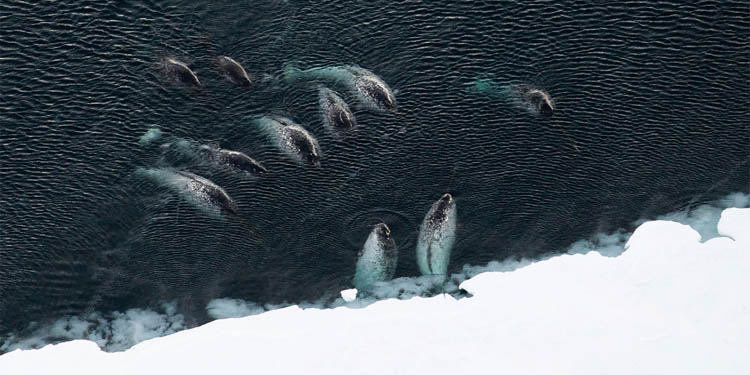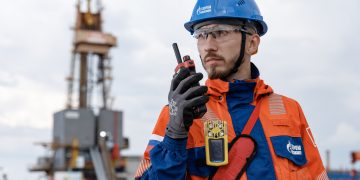Gazprom Neft Successfully Completes the First Expedition Under its ‘Narwhal: Legend of the Arctic’ Project
Following a four-week scientific expedition to the Franz Joseph Land archipelago researchers have succeeded in obtaining unique data on narwhal habitats in the Russian Arctic, to be used as the basis for a comprehensive programme on research into this rare species running to 2022.*
The “Narwhal: Legend of the Arctic” project was presented by Alexander Dyukov, CEO and Chairman of the Management Board, Gazprom Neft, at a meeting of the Board of Trustees of the Russian Geographical Society (RGS) chaired by Vladimir Putin, President of the Russian Federation in 2018.**
This project is making it possible to assess the status of the narwhal population in the western sector of the Russian Arctic, determine the numbers and distribution of the species, and put in place a programme to preserve the narwhal and its habitat. No extensive research into this species has ever been undertaken, hitherto.
Gazprom Neft, together with its scientific partner, the A.N. Severtsov Institute of Ecology and Evolution (RAS) has, as part of a reconnaissance expedition, successfully completed the first fully-fledged field research into this rare marine animal. Researchers have recorded sightings of narwhal in the northern part of the archipelago around the Carl Alexander and Jackson Islands, including groups of up to 30 narwhals comprising males, females and offspring (calves). Researchers indicate that recording several maternal groups around a single body of water, all at the same time, represents a major event, and something that might be attributable to the waters of the archipelago serving as a wildlife habitat for female narwhal of reproductive age. This new data, obtained during the expedition, will make it possible to put in place a programme on further research into the narwhal and their high-latitude habitats in the Arctic, to run to 2022. These investigations by the “Narwhal: Legend of the Arctic” research team were undertaken as part of the “Transarctica-2019” expedition.***
The “Narwhal: Legend of the Arctic” project is an ecological project forming part of Gazprom Neft’s major “Time of the Arctic” programme.**** Leading the development of the Russian Arctic brings with it a major responsibility in preserving the region’s unique ecosystem and biological diversity. Gazprom Neft is, already, implementing several major ecological initiatives in this area of activity. The Prirazlomnaya rig is operating in strict compliance with a policy of “zero emissions”, eliminating entirely any risk of industrial or domestic waste reaching the sea. Technologies to prevent any thawing of unique permafrost soil are used during construction, and oil-pipeline projects are designed to allow crossings for migrating reindeer. Gazprom Neft is also involved in protecting and replenishing fish-breeding stocks, with the company releasing more than 43 million muksun, northern whitefish (peled) and other breeds of fish into the Ob-Irtysh basin over the last three years.
Alexander Dyukov, CEO and Chairman of the Management Board, Gazprom Neft, commented: “Gazprom Neft is actively developing major investment projects in the Arctic, including offshore. Ensuring environmental and ecological support for our activities is of major importance to us. We are convinced that developing the Arctic should not have any impacts on its unique natural diversity — which is why every one of our assets here operates on the principle of ‘zero emissions.’ The company is also involved in cleaning-up Arctic territories after the pollution from previous years, and is implementing new projects in investigating and preserving the region’s ecosystem. We are delighted that this project, on studying that rare Arctic creature, the narwhal, has secured its first important results. The experts tell us meeting a group of narwhal during their reconnaissance expedition was a major stroke of luck: the data they have obtained will form the basis for subsequent field research in the short term.”
Dmitry Glazov, Scientific Lead on the “Narwhal: Legend of the Arctic” project added: “These results still have to be processed and understood, but we can, already, say that we’ve collected some very valuable scientific material. Hopefully we’ll be able to answer some of the questions surrounding the habitats of the narwhal, as well as other marine mammals and birds in the changing climate of the Arctic.”







